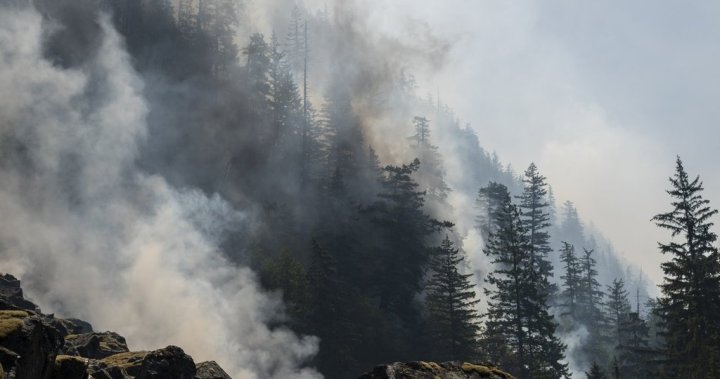Some U.S. members of Congress are demanding “better forest management” in Canada, saying “suffocating” wildfire smoke is dangerous and makes it difficult to “get outside.”
“As we are entering the height of the fire season, we would like to know how your government plans on mitigating wildfire(s) and the smoke that makes its way south,” Wisconsin Rep. Tom Tiffany and Minnesota Rep. Brad Finstad said in a letter addressed to the Canadian embassy in D.C.
The letter goes on to say it’s not the first year Canadian wildfire smoke has been “an issue.”
Tiffany and Finstad blame “a lack of active forest management” and arson for the wildfires.
“With all the technology that we have at our disposal, both in preventing and fighting wildfires, this worrisome trend can be reversed if proper action is taken,” they wrote.
“In our neck of the woods, summer months are the best time to spend time outdoors recreating, enjoying time with family, and creating new memories, but this wildfire smoke makes it difficult to do those things.”
Tiffany, in a post on X, said Minnesota representatives Pete Stauber and Michelle Fischbach, Wisconsin Rep. Glenn Grothman, and Republican Majority Whip and Minnesota Rep. Tom Emmer had joined the letter as well.
Wildfires have been raging across multiple parts of Canada since the spring, with a total of 2,672 to date and about 354 fires currently active.
According to the National Wildland Fire Situation Report from Natural Resources Canada, 105 of those wildfires are uncontrolled.

Get breaking National news
For news impacting Canada and around the world, sign up for breaking news alerts delivered directly to you when they happen.
Canadian federal officials had warned in early June that this wildfire season was expected to be challenging.
The wildfire smoke forecast, provided by BlueSky Canada’s FireSmoke app, currently shows wildfire smoke stretching across much of Saskatchewan and Manitoba, but also drifting south into North and South Dakota, Minnesota, Michigan, Wisconsin, Ohio and other U.S. states.
In May, Manitoba RCMP made a pair of arson arrests connected to a rash of wildfires spreading across the province at the time.
Last month, several states, including Minnesota, issued air quality warnings, while Nebraska issued a smoke advisory at the time and Wisconsin cautioned people to limit time outdoors.
Wisconsin has not issued another advisory since June 3, while Minnesota’s Pollution Control Agency currently lists air quality in the state as good to moderate.
Global News has reached out to the federal government for a response.
Read a full transcript of the letter, addressed to the Canadian embassy in D.C., below.
Dear Ambassador Hillman,
We write to you today on behalf of our constituents who have had to deal with suffocating Canadian wildfire smoke filling the air to begin the summer. As we are entering the height of the fire season, we would like to know how your government plans on mitigating wildfire and the smoke that makes its way south.
As I’m sure you know, this is not the first year Canadian wildfire smoke has been an issue. In 2023, Canada had its worst year for wildfires on record, last year’s fire season was considered one of the worst, and this year seems to be a continuation of these previous years.
While we know a key driver of this issue has been a lack of active forest management, we’ve also seen things like arson as another way multiple large wildfires have ignited in Canada. With all the technology that we have at our disposal, both in preventing and fighting wildfires, this worrisome trend can be reversed if proper action is taken.
Our constituents have been limited in their ability to go outside and safely breathe due to the dangerous air quality the wildfire smoke has created. In our neck of the woods, summer months are the best time of the year to spend time outdoors recreating, enjoying time with family, and creating new memories, but this wildfire smoke makes it difficult to do all those things.
Canada has been a friendly neighbor of the United States and the states we represent, so given the significance of this issue we urge you to relay this message to your government, in particular Natural Resources Canada and the Canadian Forest Service.
Thank you for your time and consideration. We look forward to your response.
Tom Tiffany, member of Congress
Brad Finstad, member of Congress
Read the full article here

